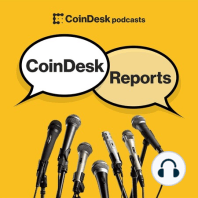41 min listen

BORDERLESS: BitMEX Charges, a Digital Euro, Fighting Belarusian Censorship and New Ransomware Concerns
FromCoinDesk Reports
BORDERLESS: BitMEX Charges, a Digital Euro, Fighting Belarusian Censorship and New Ransomware Concerns
FromCoinDesk Reports
ratings:
Length:
28 minutes
Released:
Oct 8, 2020
Format:
Podcast episode
Description
From the CoinDesk Global Macro news desk, this is Borderless – a twice-monthly roundup of the most important stories impacting Bitcoin and the crypto sector from around the world. It’s created by reporters Nikhilesh De, Anna Baydakova and Daniel Nelson.Last week, two federal U.S.agencies brought charges against BitMEX, one of the world’s largest crypto derivatives trading platforms, alleging the company violated multiple laws by allowing U.S. customers to trade its options contracts. The U.S. Attorney’s Office for the Southern District of New York, a prosecutor, claimed the exchange and its owners, CEO Arthur Hayes, CTO Samuel Reed, Ben Delo and Gregory Dwyer violated the Bank Secrecy Act by not conducting any know-your-customer procedures, while the Commodity Futures Trading Commission alleged that BitMEX allowed U.S. customers to trade on its platform, despite the fact that the startup hadn’t registered as an exchange with the company. The charges are both criminal and civil, and the SDNY announced that while it had arrested one of Hayes’ colleagues, Hayes himself remains at large.Across the pond, the European Union is preparing to set the fate of its much-hyped “digital euro.” In its latest report, released last week, the bloc’s central bank reiterated the importance of preparing a EU CBDC future but once again refused to commit to it. That decision is expected in the middle of next year. But central bankers are nonetheless thinking through what a “digital euro” might look like right now. For example, one “requirement” is that any “digital euro” should have “cash-like features.” That means broad accessibility, offline capabilities, widespread acceptance, all the cash-like features we don’t even think about. ECB officials even set “strong european branding” as a requirement.Belarus has been protesting against its president Alexander Lukashenko since August. And since then, the government has been trying to limit access to the information: in addition to multiple internet outages, local media and political movement websites have been blocked. News publications are looking to new, decentralized tools to fight back.A San Francisco-based startup called Clostra is offering a peer-to-peer file-sharing service called NewNode. Users can connect devices using the internet, Bluetooth or WiFi hot-spots, sharing information similarly to how torrent clients operate (indeed, Clostra was founded by former BitTorrent director of engineering Stanislav Shalunov). Reporters Nikhilesh De, Daniel Nelson and Anna Baydakova discuss these issues and more on today’s episode of Borderless.See Privacy Policy at https://art19.com/privacy and California Privacy Notice at https://art19.com/privacy#do-not-sell-my-info.
Released:
Oct 8, 2020
Format:
Podcast episode
Titles in the series (100)
RESEARCH: Confessions of a Sharding Skeptic by CoinDesk Reports